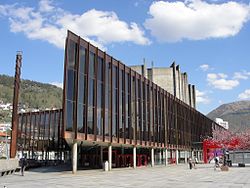History

Established in 1765 under the name Det Musicalske Selskab (The Musical Society), it later changed its name to Musikselskabet Harmonien. Bergen citizens often refer to the ensemble as "Harmonien" (the Harmony).
After World War I, there was strong interest in the major Norwegian cities of Bergen and Kristiania (later Oslo) in having larger orchestras. In 1919, the orchestra in Bergen was reorganized to employ 40 professional full-time musicians. As of 2015, the orchestra has 101 musicians.
The orchestra has had a long tradition of playing contemporary music. Ludwig van Beethoven's second symphony was performed in Bergen in the year it was published, 1804, even before it was performed in Berlin. Bergen-born composer Edvard Grieg had close ties with the orchestra, and was artistic director from 1880 to 1882. He also bequeathed a portion of his estate to a fund which continues to provide financial support for the orchestra. Other composers have served as principal conductor of the orchestra, including Arvid Fladmoe, Johan Halvorsen, Iver Holter, Richard Henneberg, Olav Kielland and Per Winge. Composer Harald Sæverud was frequently invited to conduct his own works, and the orchestra continues to commission and perform new compositions on a regular basis. Other composers who have conducted their own works with the orchestra include Aaron Copland, Karl Nielsen, Jean Sibelius, Witold Lutosławski, Lukas Foss, and Krzysztof Penderecki. In 1953, the Festspillene i Bergen was started and Leopold Stokowski was contracted to conduct the orchestra. Other conductors at the Bergen Festival have included Eugene Ormandy and Sir Thomas Beecham.
Andrew Litton became principal conductor in 2003 and artistic director in 2005. In 2002, the orchestra began to record the complete orchestral works of Edvard Grieg, the first Norwegian orchestra to do so. Norwegian conductor Ole Kristian Ruud and the orchestra recorded the final of the 7 CDs for BIS, in 2005. Litton now has the title of conductor laureate with the orchestra.
The orchestra's most recent chief conductor was Edward Gardner, beginning in 2015. [1] [2] In January 2017. the orchestra announced the extension of Gardner's contract in Bergen through 2021. [3] In September 2019, the orchestra further extended Gardner's contract through 2023. [4] In June 2021, the orchestra announced a 1-year extension of Gardner's contract through July 2024. [5] In November 2021, the orchestra announced the appointment of Sir Mark Elder as its next principal guest conductor, effective 1 August 2022, with an initial contract of three years through 31 July 2025. [6] Gardner concluded his tenure as chief conductor at the close of the 2023–2024 season, [7] at which time the orchestra named him its æresdirigent (honorary conductor). [8]
Many members of the orchestra teach at the Grieg Academy of Music, which is a music conservatory within the University of Bergen.
